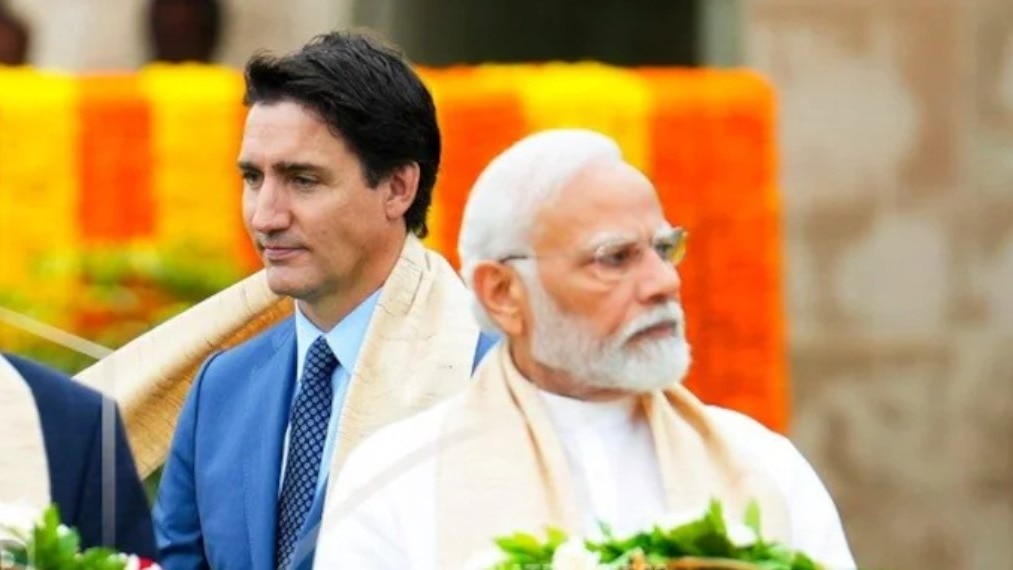


India has strongly condemned the Canadian government, led by Prime Minister Justin Trudeau, for allegedly providing a safe haven for violent extremists and terrorists to harass and intimidate Indian diplomats and community leaders. This comes after a diplomatic communication from Canada suggesting that Indian diplomats were "persons of interest" in an investigation, raising suspicion of the Canadian government's political agenda. India warns that any further deterioration in bilateral ties will result in severe consequences for Canada.
Trudeau-India Rift: Harassing Diplomats, Terrorism Allegations Spark Diplomatic Row
India and Canada, once close diplomatic partners, have been embroiled in a bitter diplomatic feud in recent months, sparking concerns about the future of their bilateral relationship. At the heart of the dispute lie accusations of Canada providing a safe haven for violent extremists and terrorists who have targeted Indian diplomats and community leaders.
Background
The tensions between Canada and India intensified in early 2023 when India received a diplomatic communication from Canada suggesting that Indian diplomats were "persons of interest" in an investigation into an alleged terrorist threat. India viewed this as a serious allegation and demanded an explanation from Canada.
Canadian Prime Minister Justin Trudeau responded by stating that Canada had received credible intelligence regarding potential threats to Indian diplomats from extremist elements. However, he did not provide specific details or evidence to support these claims.
Indian Condemnation
India strongly condemned Canada's allegations, accusing the Trudeau government of politicizing the issue and damaging bilateral ties. The Indian Ministry of External Affairs (MEA) issued a statement warning that any further deterioration in relations would have "severe consequences" for Canada.
The MEA also alleged that Canada had become a "breeding ground" for Sikh extremist groups that were behind several attacks on Indian interests in Canada, including the 1985 Air India bombing that killed 329 people.
Canadian Response
Canada has maintained that it takes all threats to security seriously and that it acted in good faith when it shared intelligence with India. Trudeau has also expressed regret for any damage caused to bilateral relations but has not apologized for the allegations.
Top 5 FAQs and Answers
Q1: Why is India accusing Canada of harboring extremists? A1: India alleges that Canada has provided a safe haven for Sikh extremist groups that have been involved in attacks on Indian interests in Canada and elsewhere.
Q2: What is the evidence for Canada's allegations against Indian diplomats? A2: Canada has not publicly released specific evidence to support its claims that Indian diplomats were linked to terrorist threats.
Q3: What is the potential impact on India-Canada relations? A3: The diplomatic feud has strained relations between the two countries, and India has warned of "severe consequences" if the situation does not improve.
Q4: Is there a history of tensions between Canada and India? A4: Yes, there have been periods of tension between the two countries, particularly over issues related to Sikh separatism and alleged support for terrorism.
Q5: What is the future of the India-Canada relationship? A5: The future of the relationship is uncertain, and it depends on how the two sides resolve their current dispute. Both countries have expressed a desire to maintain strong ties, but the allegations and counter-allegations have made this difficult.

A lone ISIS gunman ambushed a group of US service members and civilians in Syria, killing two and injuring three. The gunman was eventually killed by partner forces, confirmed by the US Defence Secretary. This is the first attack on US troops in Syria since the fall of President Bashar al-Assad. The casualties were transported to a nearby garrison and their identities will be withheld until their next of kin have been notified.

Pakistan's Prime Minister, Shehbaz Sharif, caused a major stir in Turkmenistan when he decided to gate-crash a meeting between Russian President Vladimir Putin and Turkish President Recep Tayyip Erdogan after waiting for 40 minutes. This impulsive move showcases Pakistan's increasing diplomatic insecurity and diminishing geopolitical clout. As Sharif struggles to secure meaningful engagements with major powers, he also faces domestic crises and is under the control of Army Chief Asim Munir. Meanwhile, the event in Turkmenistan marked a milestone for the country's declaration of neutrality and its efforts to maintain independence from both Western and Russian influence.

During an international forum in Turkmenistan, Pakistan's Prime Minister Shehbaz Sharif faced an embarrassing diplomatic moment as he walked into a private meeting between Russian President Vladimir Putin and Turkish President Recep Tayyip Erdogan. Sharif had been waiting for over 40 minutes for his scheduled meeting with Putin, causing him to enter the ongoing conversation between the two leaders. The incident, captured on video and shared by RT India, has triggered widespread mockery on social media with users making jokes about Sharif's actions. This comes as Pakistan attempts to strengthen its ties with Russia, while Putin maintains a closer relationship with India.

The latest bout of border fighting between Thailand and Cambodia has escalated, with hundreds of thousands of civilians displaced and casualties on both sides. The renewed skirmishes have shattered a ceasefire proposed by U.S. President Donald Trump in July. The leaders of both countries have promised to continue their aggressive stance, causing further tension and concerns for the safety of civilians. This has even resulted in the withdrawal of Cambodia's team from a regional sporting event.

Notorious Naxalite commander Ramdher Majji, along with his group, surrendered to the police in Chhattisgarh. This surrender marks a milestone in the fight against Naxalism, as the state's Deputy Chief Minister states that 80 percent of the menace has been eradicated. With the government's resolved aim to eliminate Naxalism by 2026, the country is heading towards a permanent solution to this long-standing issue. Home Minister Amit Shah also noted the significant progress made in reducing Naxal violence, with only 10 percent of the nation's population currently affected compared to 120 million people in the past.

After the tragic fire at their club in Goa, owners Gaurav and Saurabh Luthra have been detained in Thailand and are expected to be brought back to India soon. The Indian agencies have been in constant communication with Thai authorities and have managed to locate the brothers outside the main city area. With their detention, the process for their deportation has been initiated and Indian agencies are coordinating with Thai authorities for their return. The article also explains the general procedure for deportation of foreigners from Thailand under immigration laws.

Two years after the shocking death of Dawn Sturgess from Novichok poisoning, a public inquiry has released its final report. The report, overseen by retired Supreme Court justice Lord Hughes of Ombersley, examined whether British officials had taken adequate precautions to prevent the attack on ex-spy Sergei Skripal and his daughter Yulia in March 2018. The inquiry also investigated whether Ms. Sturgess's death could have been avoided with timely public warnings about abandoned objects. Good Morning Britain correspondent Richard Gaisford reported live from Salisbury, where the attack first came to light, to reveal the disturbing findings of the inquiry.

The Indian Air Force (IAF) has found a solution to maintain its aging Jaguar fleet by obtaining over 20 retired aircraft from the Oman Air Force. These jets will be dismantled and used as spares, as global production of Jaguar has ceased. With this transfer, India will become one of the few countries to still operate the Anglo-French supersonic attack aircraft. The collaboration between India and Oman in this regard reflects their robust defense partnership.

In a monumental decision, UNESCO has officially named India's beloved festival of lights, Deepavali, to its prestigious Intangible Cultural Heritage List during a committee meeting at the iconic Red Fort in Delhi. The news was met with joyous celebrations and performances, with Prime Minister Modi expressing his pride and noting the global impact of Deepavali's inclusion. This marks the sixteenth element from India to be inscribed on the Representative List, solidifying the country's rich cultural heritage.

India's festival of lights, Deepavali, has been added to Unesco's list of Intangible Cultural Heritage, following in the footsteps of Durga Puja. Prime Minister Narendra Modi expressed his delight at the nomination, stating that the festival is closely tied to India's culture and ethos. The nomination process for Deepavali involved diverse communities and experts, showcasing the festival's reach beyond the country, as it joins India's 15 elements already on Unesco's list.